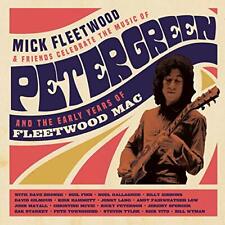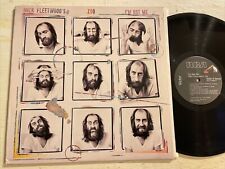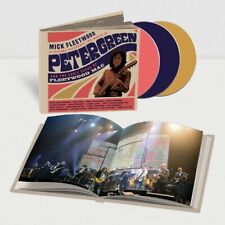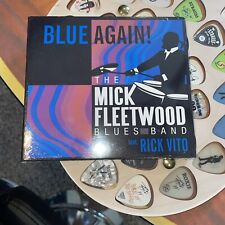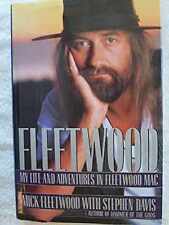Mac's back, but Buckingham goes his own wayJon Bream / Star Tribune Lindsey Buckingham wanted advice: Should he press on with the reunited Fleetwood Mac or return to his solo career? The guitarist-singer-songwriter was heading into a meeting with his manager to discuss his future with Fleetwood Mac. The band's de facto music director and official producer, Buckingham interrupted a solo project to step back into Mac, but he had promised Reprise Records executives that his commitment would be finite -- an MTV reunion concert, a live album from that show and a concert tour of 40 or so cities that comes to Target Center Wednesday before ending next month. "There's a showdown coming today or tomorrow," Buckingham said last week. "My manager knows I'm edgy about waiting too long. I have an album that maybe needs another month or two worth of work; I've worked on it for two years. That whole thing is in the present; this is such a time warp, in a way, for me. If I do more concert dates, it'll be another year before that album gets done. What advice would you give me?" Given the brilliance of Buckingham's 1993 performance at the tiny Fitzgerald Theater in St. Paul (with a band featuring six guitarists), it's easy to envision him going his own way. That's the way he's leaning, but nothing ever seems easy when Buckingham gets together with singer-songwriters Stevie Nicks and Christine McVie and the enduring rhythm section of Mick Fleetwood and John McVie. To hear Buckingham, who turned 50 Friday, talk about his solo career vs. the future of the once-again best-selling Fleetwood Mac sounded strikingly similar to comments Don Henley made two years ago during the Eagles' wildly successful reunion tour. It's clear that Buckingham's priorities, like Henley's, are to press forward with his own work, despite the pull of old bandmates who would be relatively nowhere without him. Buckingham rejoined Fleetwood Mac for two reasons -- to bring some closure after his messy departure in 1987 and to reposition his solo career by gaining fans -- and some leverage with the Reprise staff, who market his albums as well as Fleetwood Mac's. "I saw actress Holly Hunter interviewed once saying, 'If you want longevity, you can't always do the movies you want to make," said Buckingham Tuesday in a wide-ranging 70-minute conversation from his New York hotel. "You've got to do one for you and one for the machinery.' " Not that Buckingham is complaining. He said the first six concerts have gone great. Nicks' fragile voice has held up. And everyone is getting along. Even though each member has a separate manager, this isn't one of those reunion tours where the stars arrive in their own limousines and head to different dressing rooms. "I'm having a great time, and there's no real baggage attached to the interactions with the people," said Buckingham. "Everyone has moved along, and that was not something I was necessarily expecting. I was not expecting it to be as sweet and fun as it has been." Rumours and denial Twenty years ago, when Fleetwood Mac's "Rumours" became the then-biggest selling album of all time (25 million worldwide), the group was a musical soap opera. The Buckingham-Nicks romance was ending, the McVies' marriage had broken up, and Fleetwood's wife was having an affair with his best friend. Plus there was drug and alcohol abuse. Why didn't the band self-destruct then? "We were inside a whirlwind, the five of us were caught up in such a large machine," reflected Buckingham, who admits to years of being in denial. "Maybe if stakes hadn't been so high, we would have broken up. . . . It worked out. Everybody's OK; that's the main thing." Buckingham said even though he and Nicks split up in '77, he didn't feel "totally free of those issues" until he left the band 10 years later. She and Christine McVie stayed on until '90. In '92, the "Rumours"-era lineup reunited to sing "Don't Stop" at President Clinton's inauguration. Two years later, Fleetwood and John McVie re-formed Fleetwood Mac with veteran British guitarist Dave Mason and 26-year-old American singer Bekka Bramlett. "They'd really taken the name into the mud. God only knows what that was all about -- money, I suppose," Buckingham said. "Mick's whole trip has never been about concept. His mode of survival was reaching his hand out and allowing people he liked to come into the band." Fleetwood Mac started in 1967 as a British blues band, a spinoff of John Mayall's famous Bluesbreakers. Over the years, Fleetwood Mac -- the name comes from drummer Fleetwood and bassist McVie -- has had various guitarists, including Peter Green, Jeremy Spencer and Bob Welch. Keyboardist-singer Christine Perfect, who later married McVie, joined in 1970. While recording in Los Angeles, producer Keith Olsen introduced Fleetwood to a San Francisco duo called Buckingham-Nicks, who were soon invited to join the band's 10th lineup. Its self-titled album in 1975 became a 5-million-selling smash, featuring the hits "Over My Head," "Say You Love Me" and "Rhiannon." Two years later came the Grammy-winning "Rumours" with the triumphant "Go Your Own Way," "Don't Stop," "Dreams" and "You Make Loving Fun." The magic of Fleetwood Mac was "five very unlikely individuals from totally different places coming together," Buckingham said. "There's a natural theater to that." Moreover, the band had three different voices, men and women, singing dialogues about themselves that were "microcosms of the human endeavor." Singing solo Nicks has had a successful solo career, scoring a string of hits including "Stop Draggin' My Heart Around" (with Tom Petty), "Leather and Lace" (with Henley), "Edge of Seventeen," "Stand Back" and "Talk to Me." The experimentally-inclined Buckingham had modest solo success with the singles "Trouble" and "Go Insane." Christine McVie enjoyed one solo hit, "Got a Hold on Me," in '84. This year's reunion was prompted when Buckingham asked Fleetwood to play drums on his solo album. John McVie was brought in, too, and then Christine McVie on keyboards. Fleetwood pressed Buckingham for a reunion, and Reprise executives applied the final arm-twisting. Meanwhile, Buckingham and Nicks had reconciled while recording a song for the 1996 movie "Twister." Fleetwood Mac's comeback album, "The Dance," which includes four new songs, made its debut in early September at No. 1 and still remains in the Top 5, which has surprised Buckingham and others. "Why people want this is less about the music," he said. "It's more about as the world continues to roll on in an increasingly faceless and heartless manner, this group of people represents a certain little pocket of heart." There have been discussions about Fleetwood Mac going into the recording studio, though the arrangements could be complicated because Christine McVie is selling her Los Angeles home and moving back to London. The noncommital Buckingham said he might consider finishing his solo album, doing a solo tour and then recording with Fleetwood Mac. Said Buckingham: "It's nice to have the options."
|





